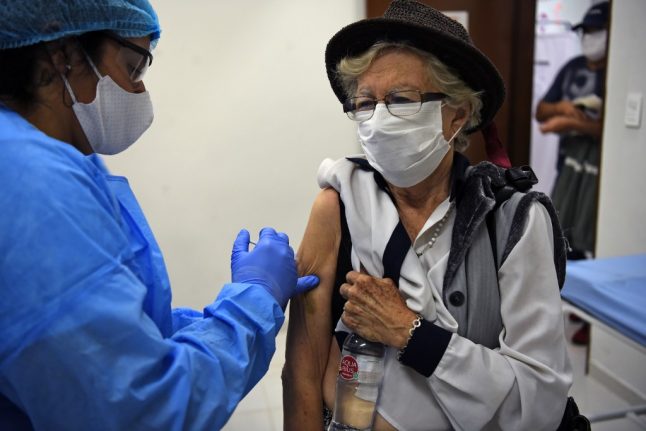When does the flu season begin and end?
Flu season typically peaks between December and February, but it can last longer. It is difficult to predict whether the coming season will be ‘light’ or ‘heavy’.
All we know is that this year, we have the unusual confluence of two illnesses — flu and coronavirus — which potentially presents a double threat for the body and healthcare system.
Can you get both diseases at the same time?
As Covid-19 is an unprecedented illness, and this is the first time that we have to deal with it and the flu simultaneously, there is no data on how likely it is to be infected with both – although doctors have certainly not excluded it.
Why do Swiss health authorities recommend the flu vaccine?
In the midst of the coronavirus outbreak we can forget that flu is also potentially a serious and sometimes fatal illness.
According to the official Swiss information platform Infovac, “the flu is the cause of a thousand hospitalisations every winter. And every year in Switzerland, at least 400 deaths are due to influenza, and their number can exceed a thousand during large-scale epidemics”.
And Federal Office of Public Health (FOPH) say that flu” can lead to sometimes serious complications. Throat, sinus and middle ear infections, pneumonia, myocarditis (inflammation of the heart) or neurological complications can be caused by influenza viruses or by so-called secondary bacterial infections”.
In Switzerland, each year influenza leads to 112,000 to 275,000 medical consultations, FOPH said.
But there is also another reason why health authorities recommend this vaccine: to prevent the overload of the health system.
According to Christoph Berger, president of the Federal Commission for Vaccination Issues, “if the Covid-19 and flu viruses circulate at the same time, the health system will be saturated quite quickly, as the number of medical consultations, emergencies, and hospital stays increases”, Berger said.
But as more people get vaccinated against the flu, “we will be able to maintain our health system”, he added.
Who is most at risk for flu complications?
“The risk of severe complications is significantly increased for pregnant women, premature babies, people with certain chronic diseases or conditions, and for elderly persons. In rare cases, such complications can also affect healthy young adults”, FOPH said.
In other words, people over 65, as well as those whose immune systems are weakened due to pre-existing medical conditions, are encouraged to get the shot if their doctor recommends it.
READ MORE: Will Switzerland be able to meet demand for the flu vaccine?
What about children?
According to FOPH, children are more vulnerable to flu viruses because their immune system is less developed than that of adults.
While many parent think flu is not a serious disease, during the 2019 / 2020 flu season, babies and toddlers constituted the most affected age group, FOPH said.
And infants can suffer more serious and protracted complications, such as pneumonia.
Vaccine skeptics argue that children should develop their own defenses against viruses.
Berger disagrees. “When you vaccinate children against the flu, they form antibodies against the antigens in the vaccine – and these are the same as those that circulate with the flu”.
Who should NOT get the flu shot?
People with life-threatening allergies to flu vaccine or any ingredient in the vaccine should not be vaccinated.
Such severe allergies are rare but if you believe you have them, speak to your doctor about other possible ways to prevent catching the flu.
Where in Switzerland can you get a vaccine?
Nearly all doctors’ practices give flu shots, as do many pharmacies.
This is a list of all the places, by canton.
But call first to see whether you need an appointment or you can just walk in.
How much does a flu vaccine cost and will it be paid by insurance?
A flu shot costs 30 francs but is paid for by health insurance for people over the age of 65, those suffering from serious chronic illnesses, pregnant women, as well as premature infants.
If you fall into the category of those who have pre-existing medical conditions, ask your doctor if you are eligible for a free shot.



 Please whitelist us to continue reading.
Please whitelist us to continue reading.
Member comments